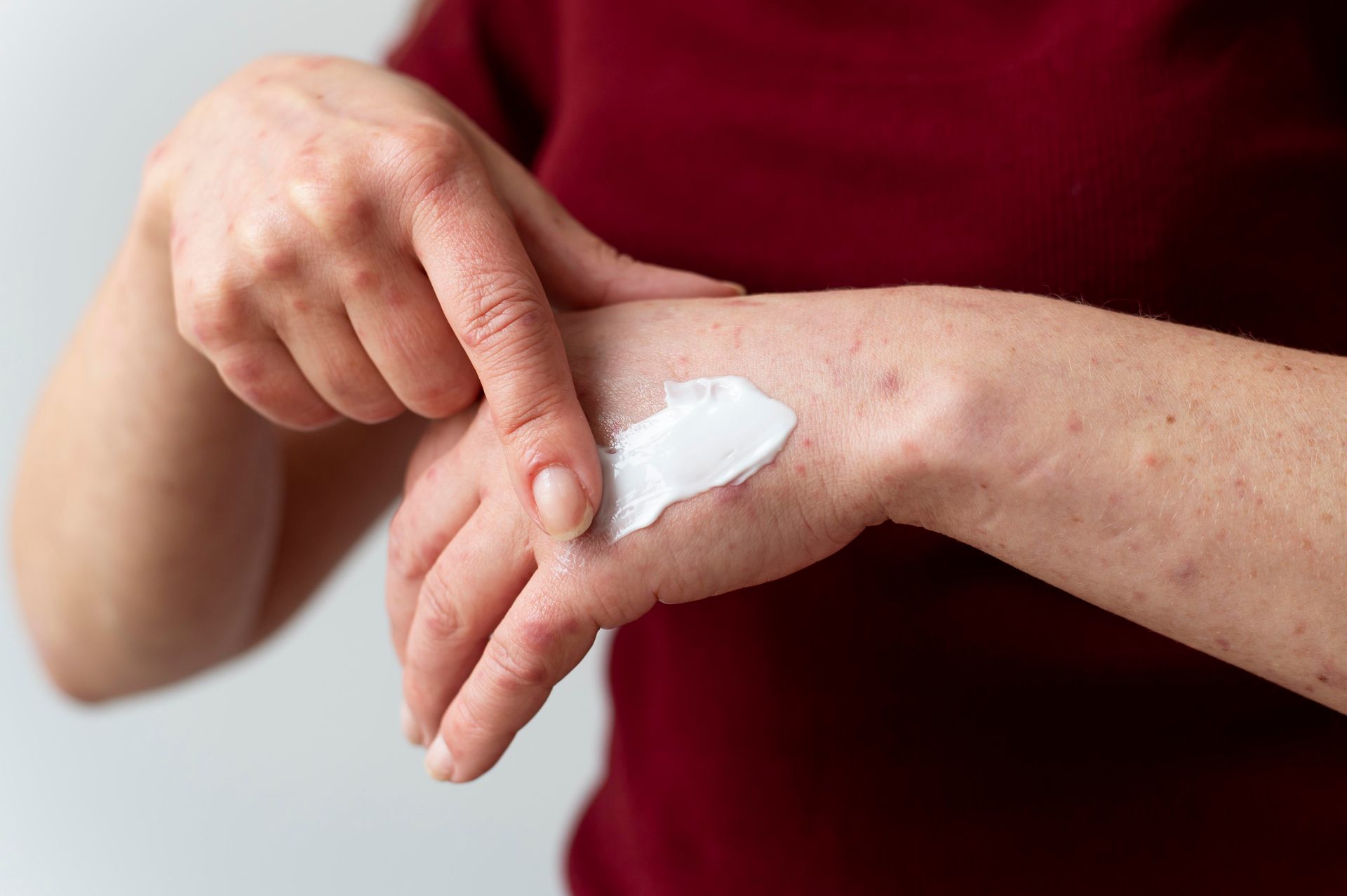Eczema can feel like a riddle your skin keeps asking, and no one seems to have the right answer.
You hear it a lot,
“It’s just dry skin, you’ll grow out of it. Try switching soaps.”
Many people think eczema is only skin-deep, but it affects the sufferer more profoundly than most would expect. It’s a chronic, immune-driven condition that flares without warning and doesn’t always respond to over-the-counter fixes.
People suffering from eczema deserve proper, informed care, but misinformation still spreads faster than science (often leading to a poor quality of life). That’s why it’s so easy to feel like you're managing it all wrong. In reality, the problem isn’t you. It's the myths.
At
Apex Allergy and Asthma, we specialize in these conditions – immune-based, complex, and often misunderstood. In this guide, we’re setting the record straight. We’ll uncover the truth behind common misconceptions and share the
eczema facts you need to know to stop second-guessing your skincare and reclaim your confidence.
Get to Know Your Skin Better
Book an Appointment Now
What Is Eczema?
Eczema is a chronic condition that affects the way your skin works, and is far more common than you think.
When the outer layer of your skin, which locks in moisture and keeps irritants out, begins to break down, it becomes vulnerable to damage. Moisture escapes. Irritants get in. And your immune system responds with inflammation.
Eczema comes in different types, each with a unique cause and pattern.
Many eczema myths persist, making it more important to approach the condition with facts and clarity. While eczema can manifest differently in each person, there are common patterns that provide clues about the specific type and its triggers.
What Actually Triggers Eczema?
There’s no single answer, but eczema is often associated with genetics, particularly in people whose families have a history of asthma, hay fever, or other allergies. That inherited sensitivity makes the skin more reactive and less resilient.
Environmental triggers then add fuel to the fire. These may include:
- Sudden weather changes, especially dry or cold air
- Sweat, heat, or prolonged exposure to the sun
- Rough fabrics like wool or synthetic blends
- Fragranced soaps, detergents, or personal care products
- Dust mites, pollen, pet dander, or mold
- Stress (both physical and emotional)
- Certain foods, particularly in children
No two people react the same way. What triggers one person’s eczema flare-up may be completely harmless to another. That’s why managing this condition takes more than guesswork. Eczema’s causes and triggers require close attention to your environment, patterns, and skin’s responses over time.
Top Myths About Eczema – And the Facts Behind Them
Myth #1: Eczema Is Contagious
Is eczema contagious? No, but we see why people would think so. It’s probably the most common assumption about eczema, and also one of the most damaging. People see the redness, the flaking, the swelling, and they step back. Some even ask if it’s safe to be around you.
Truth:
Eczema is not contagious.
You can’t catch it from someone who has it, no matter how close you are. It doesn’t spread through touch, shared surfaces, or skin-to-skin contact. Eczema is a result of internal immune activity, not an external infection.
That fear of “catching” it can isolate people who are already dealing with physical discomfort and insecurities. The truth is that eczema isn’t something you protect others from. It’s something you can manage on your own, especially with expert support from an
eczema specialist.
Myth #2: Only Children Get Eczema
Eczema often starts in childhood, but it doesn’t disappear as you grow up. In fact, many adults develop eczema for the first time well into their 30s or even later. It’s a condition that doesn’t discriminate by age.
Adult eczema can look a little different and sometimes is more challenging to diagnose because most people expect it only in kids. However, the skin barrier condition and immune reactions behind eczema don’t disappear with childhood.
If you’re an adult and you’re constantly struggling with itchy, inflamed patches of skin, it’s probably time to stop thinking it’s something “you’ll grow out of.” Regardless of age, your skin condition needs proper care, especially if it appears to be worsening.
Truth:
Eczema is a lifelong condition for many people, but with expert guidance, it becomes highly manageable at any age.
Myth #3: You Have Eczema Because of Poor Hygiene
Is eczema caused by poor hygiene? This is one of the most damaging eczema myths circulating today. This misconception carries a heavy weight, often ending up in shame. So, let’s set things straight.
Truth:
Eczema is not caused by dirty skin or bad hygiene.
In fact,
being too clean can even worsen eczema by stripping the skin’s natural oils. Overexfoliation and harsh soaps can further weaken the barrier.
So no matter how often you shower or how careful you are with cleanliness, eczema isn’t a reflection of your habits.
Myth #4: Moisturizing Makes Eczema Worse
Some people avoid moisturizers, thinking they’ll clog pores or worsen the rash.
Truth:
Actually,
hydration is essential for managing eczema.
Moisturizers help restore the skin’s barrier by locking in moisture and protecting against irritants. Skipping them can leave your skin dry and vulnerable, which only invites more inflammation and itching.
The key is choosing the right products – ones that are fragrance-free, gentle, and designed for sensitive skin. Moisturizing your skin regularly isn’t just a luxury reserved for beauty gurus. It’s a crucial skincare step that may even help prevent eczema flare-ups.
Don’t let fear stop you from giving your skin the care it needs.
Myth #5: Eczema Will Go Away on Its Own
Can eczema go away on its own?
It’s a common myth, especially when people hear about cases that seem to clear up without treatment. But just because someone else's symptoms improved naturally doesn’t mean medical care isn’t needed.
It’s not something you just wait out or ignore. For many, it’s a chronic (and painful) skin condition that requires ongoing care.
Truth:
Eczema can flare, linger, or worsen over time without proper support.
Without proper management, eczema can flare up unpredictably, sometimes severely affecting your quality of life. But with the right treatment plan tailored to your triggers, skin type, and lifestyle, you can control eczema symptoms and enjoy more itch-free days.
That means working with professionals who understand the immune system, skin biology, and your personal history. It means using the right moisturizers for your skin type, as well as making lifestyle adjustments and using medications as needed.
Yes, some individuals experience eczema symptoms that go away indefinitely when they reach adulthood, but this also means it can come back unexpectedly due to factors like stress or sleep deprivation.
Is Seeing an Eczema Specialist Worth It?
Many people think managing eczema is a solo journey that a simple Google search can fix, but it’s not. While self-care plays a role, the guidance of an allergy or dermatology specialist can make all the difference. These experts understand the complex dance between your triggers, your immune system, and your skin, and they can tailor treatments that fit your unique needs.
Why See an Allergy Specialist?
Eczema is more than a surface-level issue, and every case is distinct. Not only are allergy specialists equipped to identify underlying allergies or the root cause, but they can also rule out other conditions that resemble eczema but require different treatments.
Beyond diagnosis, specialists provide access to prescription treatments not available over-the-counter, including anti-inflammatory medications and newer therapies targeting immune responses.
With the help of an allergist, can eczema be cured? Eczema may not have a complete “cure,” but expert and consistent management can significantly reduce the frequency and severity of your symptoms. The key is active care, not passive waiting.
Regular follow-ups ensure that your treatment evolves with your condition and lifestyle, keeping your skin as healthy as possible.
Personalized Treatment Options for Eczema
No two cases of eczema are exactly alike. That’s why personalized treatment matters, which could include:
- Prescription topical steroids or non-steroidal anti-inflammatory creams
- Wet-wrap therapy to soothe severe flare-ups
- Allergy testing to identify specific triggers
- Phototherapy in some cases
- Newer biologic medications that target immune pathways
At
Apex Allergy and Asthma, we work closely with you to develop a personalized plan that suits your lifestyle, symptoms, and goals.
How Apex Allergy and Asthma Can Help You Manage Eczema
Living with eczema can feel overwhelming, but you don’t have to face it alone. Our allergists at Apex Allergy and Asthma combine medical expertise with genuine, compassionate care to support you every step of the way.
Whether you’re dealing with mild irritation or severe flare-ups, we're here to help you find relief and restore your skin’s health.
Our team understands that there’s more to eczema than meets the eye. We listen, diagnose, and tailor your treatment plan to meet your specific needs. With years of experience in immune-related conditions, our specialists bring the latest research and treatments, focusing on long-term skin health and immune balance, not
just quick fixes.
If you’re ready to take the next step toward clearer skin and greater confidence, schedule a consultation with
Apex Allergy and Asthma
today! Let’s work together to demystify eczema and build a care plan tailored just for you.
Don’t Be Ashamed of Your Skin
Schedule an Appointment Now
Frequently Asked Questions
Can eczema be linked to other allergic conditions?
Eczema often occurs alongside allergies like asthma, hay fever, or food sensitivities. This connection is known as the “atopic march,” where the immune system responds in various ways throughout life. Understanding this link can help tailor your treatment plan more effectively.
How do stress and mental health affect eczema flare-ups?
Stress doesn’t cause eczema directly, but it can trigger or worsen flare-ups by influencing the immune system and skin barrier. Managing stress through relaxation techniques or counseling can be a valuable part of your eczema care.
Are there lifestyle changes that can help reduce eczema symptoms?
Yes, simple adjustments like using fragrance-free skin products, avoiding known irritants, keeping your living environment clean from dust or pet dander, and maintaining a consistent moisturizing routine can all help reduce flare-ups.
When should I see a specialist for my eczema?
If your eczema is severe, persistent, or not responding to over-the-counter treatments, it’s time to consult a dermatologist or allergist. They can perform allergy testing, prescribe stronger medications, or recommend advanced therapies tailored to your needs.







